

How do you get a job in teaching after training. Securing your first teaching post may seem like a daunting task, but with some forward planning, the process need not be difficult.
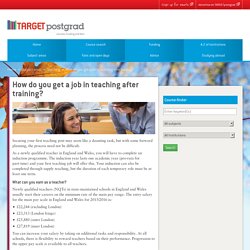
As a newly qualified teacher in England and Wales, you will have to complete an induction programme. The induction year lasts one academic year (pro-rata for part-time) and your first teaching job will offer this. Your induction can also be completed through supply teaching, but the duration of each temporary role must be at least one term.
What can you earn as a teacher? Newly qualified teachers (NQTs) in state-maintained schools in England and Wales usually start their careers on the minimum rate of the main pay range. . £22,244 (excluding London)£23,313 (London fringe)£25,880 (outer London)£27,819 (inner London) How do you get your first job in teaching? Use our guidance on the job hunting process for teachers to help you identify the role you want and succeed in getting it.
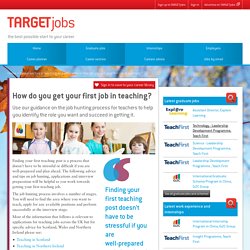
Finding your first teaching post is a process that doesn't have to be stressful or difficult if you are well-prepared and plan ahead. The following advice and tips on job hunting, applications and interview preparation will be helpful as you work towards getting your first teaching job. The job hunting process involves a number of stages. You will need to find the area where you want to teach, apply for any available positions and perform successfully at the interview stage. Most of the information that follows is relevant to applications for teaching jobs across the UK but for specific advice for Scotland, Wales and Northern Ireland please see:
Teacher training: Getting a teaching job. If you're a newly qualified teacher (NQT) or about to qualify, you need to start applying for your first teaching job...
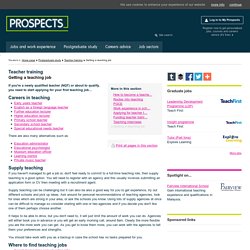
Careers in teaching There are also many alternatives such as: Teaching jobs: where to find them and when to apply. Get to grips with local authority registration schemes, pool applications and the other approaches schools use to recruit newly qualified teachers.
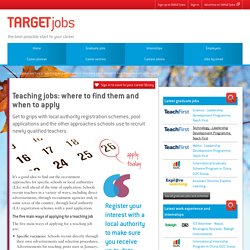
It’s a good idea to find out the recruitment approaches for specific schools or local authorities (LAs) well ahead of the time of application. Schools recruit teachers in a variety of ways, including direct advertisements, through recruitment agencies and, in some areas of the country, through local authority (LA) registration schemes with a pool application. The five main ways of applying for a teaching job The five main ways of applying for a teaching job are: Specific vacancies. Finding out about teaching vacancies from local authorities (LAs) Teacher recruitment via LAs varies throughout the UK.
Before you apply: teaching application form and CV checklist. Find out what you should know about a school before you apply for a teaching job and what to expect from the application form.
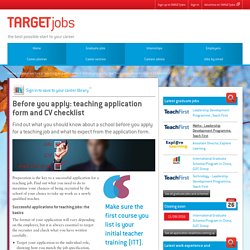
Preparation is the key to a successful application for a teaching job. Find out what you need to do to maximise your chances of being recruited by the school of your choice to take up work as a newly qualified teacher. How to write a great personal statement for a teaching job. Find out what to cover in your personal statement when you apply to work as a teacher and how to present your skills, knowledge, experience and beliefs.
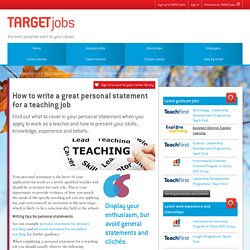
Your personal statement is the heart of your application for work as a newly qualified teacher and should be re-written for each role. This is your opportunity to provide evidence of how you match the needs of the specific teaching job you are applying for, and earn yourself an invitation to the next stage, which is likely to be a selection day held at the school. Writing tips for personal statements. Perform your best in your teaching interview. Find out how to impress at interview for your first job, whether it’s a panel or pool interview, and pick up tips for the sample lesson.

Interviews will focus on your application, your teacher training and school experience, previous work experience, interests, suitability for the particular school, and what you can contribute. You should come prepared with specific examples to offer your interviewer. Interview days can include a tour of the school, panel interview, and teaching a sample lesson. They may also include an interview with pupils and group or written activities. If you get an interview, confirm that you can attend as soon as possible, and try and arrange to visit the school prior to the interview day.
When it comes to the day of your interview, remember that first impressions really do matter. Typical teaching interview questions. Preparing for your first job. After your pre-induction (if you had one) you face the prospect of six lovely weeks before you start the job properly.
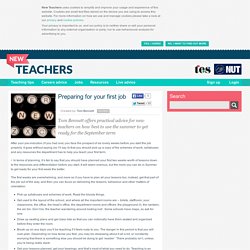
It goes without saying (so I’ll say it) that you should pick up a copy of the schemes of work, syllabuses and any resources the department has to help you teach your first term. • In terms of planning, it’s fair to say that you should have planned your first two weeks worth of lessons down to the resources and differentiation before you start. TES New Teachers. First Appointment - TES magazine. As a trainee teacher, by the end of this year it is highly likely that you will be in charge of your first classes as a full time member of the teaching profession.
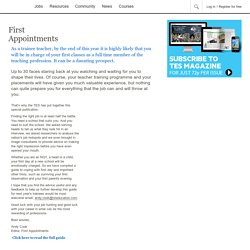
It can be a daunting prospect. Up to 30 faces staring back at you watching and waiting for you to shape their lives. Of course, your teacher training programme and your placements will have given you much valuable experience, but nothing can quite prepare you for everything that the job can and will throw at you. That's why the TES has put together this special publication. Finding the right job is at least half the battle. Whether you are an NQT, a head or a child, your first day at a new school will be emotionally charged.
I hope that you find the advice useful and any feedback to help us further develop this guide for next year's trainees would be most welcome email: andy.cook@tsleducation.com. Good luck with your job hunting and good luck with your career in what can be the most rewarding of professions. Best wishes, Teacher Network. Supply%20Teachers.